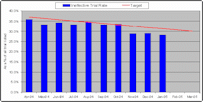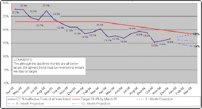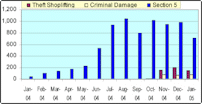Contents
Report 14 of the 17 March 2005 meeting of the Planning, Performance & Review Committee, providing an update on the work being carried out by the Department of Criminal Justice with the ultimate aim of bringing more offences to justice.
Warning: This is archived material and may be out of date. The Metropolitan Police Authority has been replaced by the Mayor's Office for Policing and Crime (MOPC).
See the MOPC website for further information.
Criminal justice update
Report: 14
Date: 17 March 2005
By: Commissioner
Summary
This report provides an update on the work being carried out by the Department of Criminal Justice with the ultimate aim of bringing more offences to justice.
A. Recommendations
That the report be noted.
B. Supporting information
Victim and witness care
1. Witness Care Units (WCU) were set up to deliver excellent victim and witness care. They currently support victims and witnesses involved in the Criminal Justice process from the point where a defendant has been charged with an offence. Witness Care Units are now in place on each of the 32 Boroughs and Heathrow.
2. The national training programme to all witness care staff is currently being delivered, at each Borough Operational Command Unit (BOCU), jointly by the Metropolitan Police Service (MPS) and Crown Prosecution Service (CPS) personnel and will end in March. Arrangements are also being made to deliver the National Training Package to witness care managers and Operation Emerald staff will assist with its delivery.
3. The National No Witness, No Justice (NW, NJ) requires co-location of MPS and CPS WCU staff. Five sites have been identified as suitable for immediate co-location. CPS staff have been recruited and co-location at these sites will be completed by March 2005. Site evaluations for the remaining boroughs are currently underway.
4. The National team have commenced reviews of the WCUs to establish a baseline against national minimum requirements. To this end additional MPS staff are being recruited for WCUs to enable them to meet the minimum requirements and a joint MPS, CPS and City of London Project Board are overseeing the implementation of NW, NJ minimum requirements in London.
5. The levels of victim and witness satisfaction will be measured nationally by the Witness and Victim Experience Survey (WAVES) introduced by the Office for Criminal Justice Reform (OCJR). It will involve telephone interviews and Local Criminal Justice Boards are being asked to assist with the collection of contact details. WCUs will be responsible for identifying victims and witnesses to participate in the survey and each WCU will be expected to provide the details of 15 victims and 15 witnesses on a monthly basis.
CPS lawyers at the point of charge
6. Operation Emerald has commenced undertaking post implementation reviews at three charging sites during February and March. This is prior to the National Charging Programme undertaking their post implementation reviews at all London charging sites during June 2005.
7. It has been decided to deliver joint ‘refresher’ training to police and CPS supervisors on Statutory Charging. The training will take place on borough through the months April – June. The training will concentrate on:
- DNA
- Anti Social Behaviour Orders
- Charging Standards
- Duty Prosecutors Action Plans
- Witness Care
- Bad Character
- Sexual Harm
- Proceeds Of Crime Act
8. The feasibility of providing a joint management-training course for Chief Inspectors, Unit Heads, Duty Prosecutors and Criminal Justice Unit (CJU) Managers is also being considered.
Effective Trial Management Programme
9. The aim of the Effective Trial Management Programme (ETMP) is to reduce the number of ineffective trials by improving case preparation and progression from point of charge to the start of the trial or earlier disposal.
10. Local implementation teams have been established for each of the 12 London Crown Court areas and feeder magistrates’ courts.
11. The local frameworks for Middlesex Guildhall and Woolwich Crown Court were presented and agreed by the London Criminal Justice Board Executive Secretariat on 14 February 2005.
12. London has been granted £466,000.00 funding for prosecution Case Progression Officers. A further bid for additional funding has been submitted. Negotiations with CPS London and City of London Police have commenced regarding the funding split.
13. Concern has been voiced over the capacity of courts with regard to the required increase in Offences Brought to Justice over the next three years. A focus group is to be established, involving Operation Emerald, to look at a sample of courts in detail, linking in with the Court Capacity work already underway.
National Strategy for Police Information Services (NSPIS) Custody and Case Preparation
Implementation project
14. The MPS is now close to signing contracts with Police Information Technology Organisation (PITO) for the implementation of NSPIS across the Service. Once contracts have been signed work can start on the Data Centres.
15. There were two technical issues that have been resolved. The issue of the CPS accepting electronic case files, without a paper copy, has been escalated and work continues to resolve this at a national level.
16. CPS acceptance of electronic files was a caveat for acceptance of the system by the MPS and early resolution of this does not appear likely. Rather than delay the project further, the MPS is taking custody in full and phasing in case functionality. Phase 1 will include non-CPS related functionality and Phase 2 with the remainder, will follow once the file issue has been resolved. This will allow the MPS to start realisation of some benefits with the remainder following in due course.
17. Case and custody applications continue to be used at Newham and work is ongoing to develop business processes to support the phased implementation as well as resolving local issues.
18. Criminal Justice Information Technology and NW,NJ have announced the development of a witness care package for the CPS case management system. This will be the recommended system for witness management for police forces throughout the UK. The MPS will look to introduce this into our WCUs’. With this development in mind, work on the NSPIS witness care functionality has been put on hold. The new system is likely to be available from November and will be Aware based.
Increasing detection rates
19. In January a paper entitled the ‘Contribution of Sanction Detections Performance to the Offences Brought to Justice Target’ was published by the Office of Criminal Justice Reform and the Prime Ministers Delivery Unit. The Sanction Detection Team have been tasked with reviewing this paper and where necessary to ensure that the MPS is doing all it can to raise the number of sanction detections.
20. Several strands of work are already well developed by the Sanction Detection Team to improve detection rates. The Crime Control Strategy Meeting themed performance reviews’ have been undertaken since April 2004. Detection rate improvement and the critical processes that support this has been a constant theme through all reviews. This system enables managers to be held to account for performance, good practise to be shared and assistance to be requested. Operation Emerald undertakes an active role within this.
21. Several critical processes that support maximising detections have been reviewed with new procedures being implemented e.g. crime screening, crime desk manual, primary investigation minimum standards, the software to support this on the crime recording system is being developed.
22. Training for 2000 operational uniform sergeants within Teritorial Policing (TP) started on 14 February 2005. It is aimed at ‘improving detections through effective leadership and supervision’. This cross cuts many of the critical processes and directly addresses the concerns raised in the review around lack of supervision, knowledge gaps and a young and inexperienced work force.
23. Since the inception of the Sanction Detection Team, sanctioned detections within the MPS have increased steadily.
Performance.
24. The performance team has been working with London Criminal Justice Performance team to establish a single data flow. It is also planned to look at the method whereby performance is published by CPS, London Criminal Justice Board (LCJB) and the MPS to ensure there is a cross agency single approach to performance measurement.
25. Contact has also been made with the National Criminal Defence Service, which provides duty solicitors for police stations. The aim is to determine if there is any opportunity to engage the defence in performance targeting and related issues.
Larger image: Offences Brought to Justice (OBTJ)
26. The above ‘OBTJ’ chart indicates that London area is currently above the target. During January 2005 an estimated 12,074 OBTJs were recorded.
27. There has been no confirmation of the new target for 2005/2006, however, it is estimated that it will be in the region of 160,000 OBTJ. At the current rate of performance this target should be met.
28. Good work has been done by Operation Emerald in co-ordinating the activities from Greater London Magistrates Court Authority (GLMCA) in providing the information and Performance Indicator Bureau (PIB) processing it and sending it to Home Office.
29. Ineffective trials
Larger image: Ineffective trial rate (MC)
Larger image: Ineffective Crown Court trials in the London area April 03-March 05
30. London’s Ineffective trials rate (Magistrates Courts) is now at 28.2% (Jan-05).
31. This reduction is consistent and the trend continues to be downward. There is an even greater reduction in the rate for Crown Courts (27% in Aug 03 to 16.6% in Dec-04).
Some of the benefits of this are:
- More effective trials create greater confidence in the Criminal Justice system
- Witness not being inconvenienced by unnecessary visits to court
- Officers spend less time at court being more readily available for operational deployment.
Cracked trial rate
32. This is no longer monitored, as it is not a good indicator of performance. It incorporates the remainder of the trials
Definitions
- Trial – a trial includes all hearings listed ‘for trial’ and Newton Hearings (trial of an issue). A trial excludes a Pre-Trial Review (PTR). Non-CPS prosecuted trials should be counted.
- Cracked Trial - on the trial date, the defendant offers acceptable pleas or the prosecution offers no evidence. A cracked trial requires no further trial time.
- Ineffective Trial - on the trial date expected progress is not made due to action or inaction by one or more of the prosecution, the defence or the court and a further listing for trial is required.
Discontinuances
33. There has been a reduction in the number of cases discontinued from 13.5% to 10.2% (Jan-04 to Dec-04).
Persistent young offenders
34. The November 2004 Performance has been issued by Department for Constitutional Affairs -. London results are:
- MPS Arrest to Sentence – 88.6 days. Twelve cases caused the MPS to miss the 71-day target.
- The MPS has 62.7% of its Magistrates Court case being dealt within 71 days.
- The Crown Court average is 236 days for the twelve cases
35. Penalty notices
Larger image: Penalty notices for disorder [theft shoplifting, criminal damage and section 5]
Larger image: Penalty notices for disorder [penalty notice issued and OBTJ from PNDs issued]
37. The highest numbers of Penalty Notices for Disorder (PND’s) were issued in December 05 at 1702 of this number approx 1,200 contributed to OBTJ. The January 2005 figure for PND’s is incomplete as data is still being collected for this month. From November 2004 offences such as summary theft and criminal damage will contribute to Offences Brought to Justice.
Further analysis of Offences Brought to Justice
38. The following is an analysis of the OBTJ figures for convictions comparing like for like for the year to date (YTD) April to December 2003/2004. Conviction figures exclude the PNDs and street warnings for cannabis possession, which are shown separately.
Table 1: 2003/04
| Convictions | Penalty Notice for Disorder | |
|---|---|---|
| Apr-03 | 7,512 | 3 |
| May-03 | 8,149 | 12 |
| Jun-03 | 7,743 | 5 |
| Jul-03 | 8,497 | 12 |
| Aug-03 | 6,787 | 8 |
| Sep-03 | 7,408 | 9 |
| Oct-03 | 7,924 | 10 |
| Nov-03 | 7,198 | 2 |
| Dec-03 | 7,086 | 8 |
| YTD Totals | 68,304 | 69 |
Table 2: 2004/05
| Convictions | Formal Warnings for Cannabis | Penalty Notice for Disorder | |
|---|---|---|---|
| Apr-04 | 7,568 | 904 | 131 |
| May-04 | 6,928 | 1,012 | 177 |
| Jun-04 | 7,694 | 993 | 480 |
| Jul-04 | 7,662 | 1,021 | 840 |
| Aug-04 | 6,887 | 844 | 928 |
| Sep-04 | 7,397 | 1,023 | 697 |
| Oct-04 | 7,396 | 1,103 | 1404 |
| Nov-04 | 7,290 | 1,185 | 1462 |
| Dec-04 | 6,249 | 1,237 | 1702 |
| YTD Totals | 65,071 | 9,322 | 7821 |
Convictions have reduced by 3,233 for the year April 2004 to December 2004 against the same period last year. However, the number of Penalty Notices for Disorder has increased by 7,752 this has increased the overall total for the year to 72,895.
Warrants database
39. The Emerald Warrants Management System (EWMS) went live, across Borough Operational Command Unit (BOCU) Warrant Units, on the 1 November 2004. Training for the 80 Warrants Officers/ Clerks was completed in October 2004. To date there are 21,440 records on the EWMS, 15,146 of these are fail to appear Magistrate/Bench Warrants. The remaining records relate to Suspect Wanted Dockets, First Instance Warrants and Anti Social Behaviour Order (ASBO) reports. The implementation of the EWMS has provided the MPS with an accurate picture of the Warrants situation across the Service. The system allows us to set a benchmark from which we can measure future improvements/ performance. From 28 January 2005 EWMS was accessible by all BOCU operational police officers (this includes Special Constables).
40. The latest phase of Operation Halifax commenced on 17 January 2005 and ran until 28 February 2005. Operation Halifax IV is the MPS contribution to the nationwide Operation Turn-Up, launched on 14 January 2005, with the principle aim of reducing the number of outstanding fail to appear warrants.
41. The operation has resulted in a reduction in the number of fail to appear warrants held on the MPS EWMS in excess of the of 12 per cent target.
42. For the duration of Operation Halifax, all instances of fail to appear, whether police bail to court or court-to-court were charged. The final figures are
- 1877 people have been charged with failing to appear (76.4%)
- 3772 records have been removed from the EWMS. This includes 2924 arrests, of which 2218 are Operation Halifax direct arrests.
- 366 have surrendered either at court or at a police station.
- There have been 340 further charges for offences that have come to light when persons have been arrested on a fail to appear warrant.
Restorative Justice
43. Home Office ministers and the Crown Prosecution Service have now approved the "Not Proceeded With" model. The Restorative Justice team is now actively searching for eligible cases from Haringey and Lewisham boroughs. It is envisaged that the project will extend to additional boroughs. Negotiations are underway with borough commanders at present. Project work in these new boroughs should be operational within the next month.
44. The project team are analysing the raw data and will present preliminary results at a reception for stakeholders from the Crown Court and Diversion Projects, which will take place on 8 March at The Australian High Commission.
Centralised traffic criminal justice unit
45. The centralisation of traffic prosecution work has been implemented according to plan. The northeast and central regions went live on the 1 November 2004 ahead of the previous 22 November date. The northwest and central regions went live at the beginning of February 2005. All summons traffic prosecution work and the input of traffic collision reports has now been centralisd at Marlowe House.
46. The first gateway court at Greenwich, used by the south east region, continues to report efficiencies in effective first hearings, low numbers of trials and savings in police officer time in reducing the need to call them to court allowing them to be available for patrol duty. However, there are early indications that this court is unable to meet fully the prosecution workload demands being made. The MPS and CPS have taken up this matter with senior GLMCA management. The gateway courts for the northeast and central regions (Redbridge and Marylebone) will take their first cases over the next few weeks. The courts for the northwest and southwest regions (Highbury and Wimbledon) are likely to take their first cases in June 2005.
47. There have also been strenuous efforts made to improve the quality of cases put before the court, rectifying evidential and procedural errors before a case is listed.
48. The contract for the development of the Traffic Reporting Information System (TRIS) is currently being awarded. Implementation will be in two stages: the core system will be delivered by July/August 2005 and the full system, with interfaces, is planned to be completed in the early autumn 2005.
CCTV evidence in courts
49. The LCJB and MPS have identified that the wide-ranging and increased use of CCTV evidence in London in the criminal justice process may be causing delays and contributing to ineffective trials and attrition. A one-day snapshot review of over five cases from every MPS CJU identified that issues with CCTV evidence were responsible for approximately 10% of ineffective trials. The MPS therefore held a multi-agency workshop on Monday 21 February 2005 as an initial scoping exercise with the following aims and objective:
- Understand where the key blockages are in the CCTV evidential process in London.
- Identify the most important blockages.
- Examine how the processes can be best improved.
- Formulate an action plan, which will be reported back to the LCJB.
- The outcome of the workshop will be an outline action plan identifying recommendations for improving the CCTV evidential process in London.
The key findings were
- No other National Agency is tackling the issue
- There is a need to invest in specialist staff at Borough Operational Command (BOCU)level
- More training on disclosure issues is required
- There is a need to agree a standard format for police, CPS and courts to play CCTV evidence in courts
- A need to set up a London programme Board
- A need to link in with ACPO
- LCJB have requested 20K from the Office of Criminal Justice Reform to progress this issue.
Update from the last London Criminal Justice Board meeting.
Fast Track Effective Trial Management Programme (ETMP) Pilot
50. The LCJB has tasked Operation Emerald with enhancing the current ETMP process to an “ETMP Plus” standard with the aim of enabling Magistrates Courts to complete cases within 42 days. Two pilots will be implemented by the end of March within the boroughs of Haringey (for Haringey Magistrates Court) and Greenwich/Lewisham (for Greenwich / Woolwich Magistrates Court).
C. Race and equality impact
This is an update paper and therefore there are no new equality or diversity implications at this time.
D. Financial implications
The finance issues are highlighted in the NSPIS update.
E. Background papers
- None
F. Contact details
Report authors: Detective Chief Superintendent Mark Benbow For more information contact:
MPA general: 020 7202 0202
Media enquiries: 020 7202 0217/18
Send an e-mail linking to this page
Feedback




